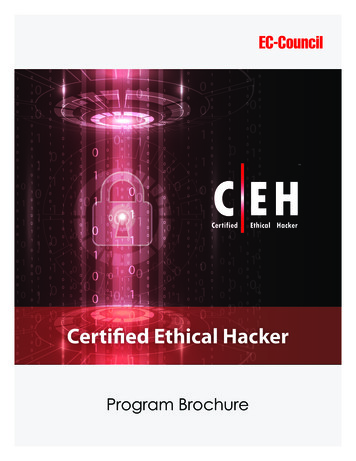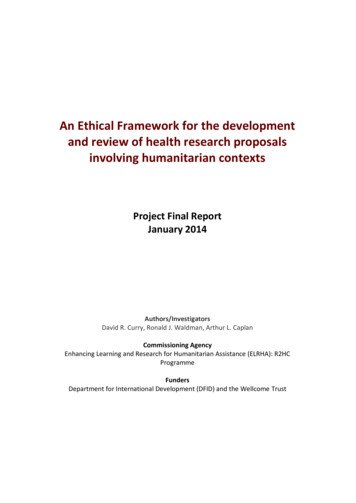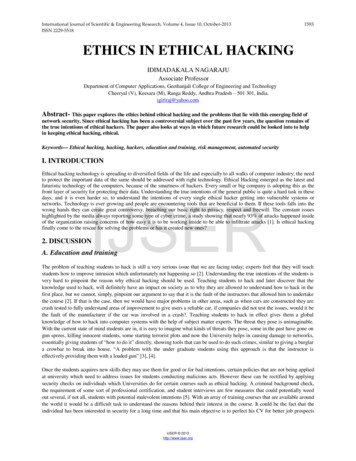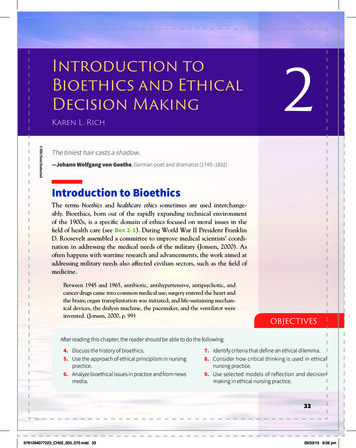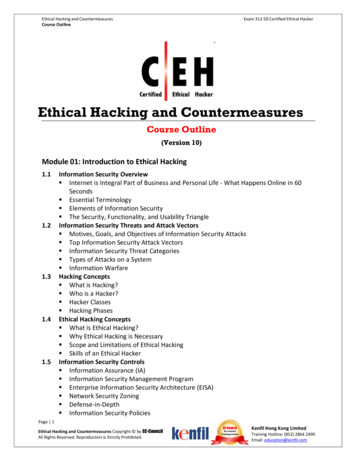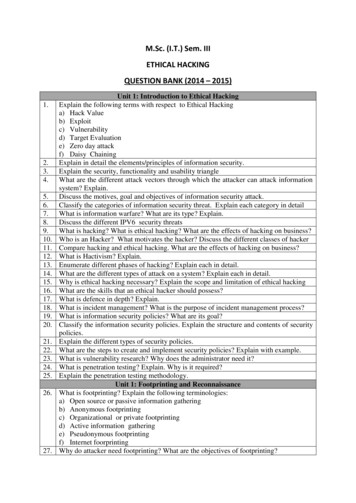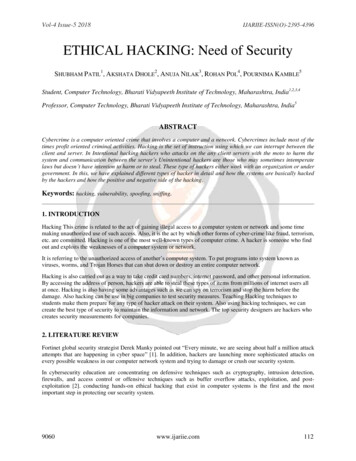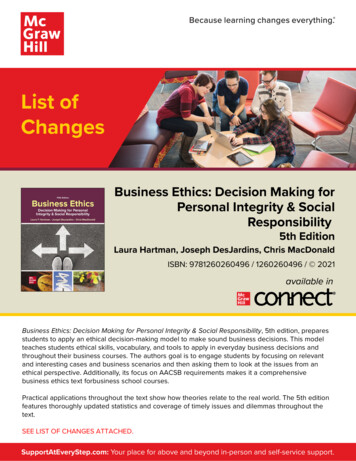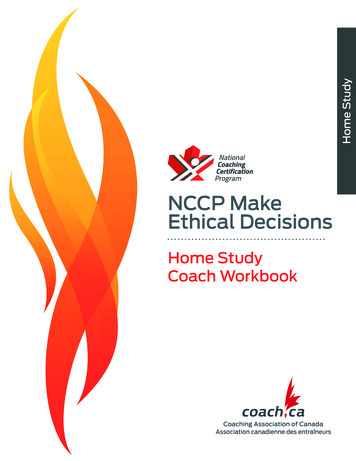
Transcription
Home StudyNCCP MakeEthical DecisionsHome StudyCoach Workbook
PARTNERS INCOACH EDUCATIONThe National Coaching Certification Program isa collaborative program of the Government ofCanada, provincial/territorial governments,national/provincial/territorial sport organizations,and the Coaching Association of Canada.The programs of this organization are fundedin part by the Government of Canada. This document is copyrighted by the Coaching Association of Canada (2020) and its licensors. All rights reserved. Printed in Canada.
NCCP Make Ethical Decisions: Coach WorkbookTable of ContentsAcknowledgements.11The National Coaching Certification Program.41.1 The NCCP 1–3–5–7 definition.51.2 NCCP core competencies.61.3 Learning outcomes.71.4 Purpose of the document.71.5 Overall context.81.6 Module topics.82Ethical, legal and value-based decisions.92.1 Defining ethics.92.2 Ethical dilemmas.112.3 Factors affecting the decision-making process. 142.4 Legal implications. 152.5 Further exploration of ethics and values. 212.6 Liability of the coach. 223Our case study. 254The ethical decision-making process. 264.1 The process. 265Make a decision. 285.1 Establish facts and assess issues and implications. 286Application. 376.1 Apply the process. 377Conclusion. 437.1 Self-assessment. 437.2 Action Card. 442020 Coaching Association of Canada
NCCP Make Ethical Decisions: Coach WorkbookAppendices. 46Appendix A: NCCP Code of Ethics. 46Appendix B: Other perspectives and tools. 48Appendix C: Case studies. 51References. 552020 Coaching Association of Canada
NCCP Make Ethical Decisions: Coach WorkbookAcknowledgementsInstructional DesignersKeely SiegleKristopher TharrisContributorsAdam SollittBarry MorrisonClaudia GagnonGarry WheelerJason SjostromKate KloosKellen BondyPeter NiedreShelley CoolidgeYolande UsherWayne Parro, ChPC (Home Study Coach Workbook)The legal content, scenarios and references to Canadian and provincial laws were reviewed bythe international law firm Gowling WLG.ProductionElite Communication, translation servicesNorm Reid, production designPaul Whittingham, production designPlum Copy, copyediting servicesThe Collection, Use, and Disclosure of Personal InformationThe Coaching Association of Canada collects your NCCP qualifications and personalinformation and shares that with all NCCP partners, according to the privacy policy detailedonline at www.coach.ca. By participating in the NCCP, you are consenting to your informationbeing gathered and shared as detailed in the privacy policy. If you have any questions or wouldlike to abstain from participating in the NCCP, please contact coach@coach.ca.2020 Coaching Association of Canada
NCCP Make Ethical Decisions: Coach WorkbookName:NCCP #:Email:What is your experience as a coach?Describe your experience as a coach including types of athletes and athletes, sports, and yourexperience as an athlete. Include information on the athletes (who they are, how many, age/stageof development), how many years of coaching, and any other relevant information you require.Marker’s comments onlyMarker’s Name:Marker’s Email:Welcome to NCCP Home StudyThis Home Study Coach Workbook (referred to as Coach Workbook throughout) is organized tosupport your independent completion of the NCCP Make Ethical Decisions module. Read all of the content in this workbook. If there is content that will further your learningbut is not required to complete a learning activity, it is indicated as such. Under each section heading, we have indicated the activities you are required tocomplete. (See 1 in image below). Where there are text fields, respond to the questions indicated. You may write as muchas you would like to express your learning. (See 2 in image below). There are Marker’s Comments boxes after each activity. Please don’t write in these, theyare for the marker’s comments only. (See 3 in image below). The shaded boxes include additional information that, if you were in the classroom, theLearning Facilitator would share with you. These boxes include information about basicmental skills, learning tips, and guiding questions. (See 4 in image below). There will be activities in this module that require you engage your participants, or otherpeople, to practice some of the techniques taught in this module.Page 22020 Coaching Association of Canada
NCCP Make Ethical Decisions: Coach WorkbookNCCP Make Ethical Decisions: Coach Workbook2Ethical, legal and value-based decisionsEthical decisions are those that live in the gray area between subjective personal morals (black)and a society’s objective, shared laws (white). The important distinction here is between ethicaland legal decisions. Review the concepts in this section. There are 3 specific activities found inthis section: 2.1.1 Brainstorm and guided reflection 2.2.2 Identifying an ethical dilemma 2.4.1 and 2.4.2 Legal vs ethical application questions2.2.2Identifying an ethical dilemmaFor this activity, review the full NCCP Code of Ethics as found in Appendix A. For each of thethree principles, describe an ethical dilemma that you have faced in the past in coaching. Ifyou cannot think of an example from coaching, provide an example from day-to-day life.What is it that makes it an ethical dilemma?1. Leadership and professionalism2. Health and safety3. Respect and integrityMarker’s comments only2020 Coaching Association of Canada2020 Coaching Association of CanadaPage 3
NCCP Make Ethical Decisions: Coach Workbook1The National Coaching Certification ProgramThis section includes key information to understand the context of this module and how it willsupport you as a coach. Read all of the information found in this section.Welcome to the National Coaching Certification Program (NCCP) Make Ethical Decisions. Thismodule’s goal is to support coaches in making ethical decisions in their day-to-day practice as acoach.This module is part of the NCCP, a national training and certification program offered in over65 sports in Canada. More than a million coaches and sport leaders have taken part in training,education and certification activities offered by the NCCP, since its inception in 1974. The NCCPis a collaborative program of the Government of Canada, provincial/territorial governments,national/provincial/territorial sport organizations, and the Coaching Association of Canada.Participants will receive NCCP credit. They can track their progress in The Locker, the NCCPdatabase that supports the efforts of all coaches involved in coach education in Canada.Page 42020 Coaching Association of Canada
NCCP Make Ethical Decisions: Coach Workbook1.1 The NCCP 1–3–5–7 definition1One Nationalprogram:National Coaching Certification Program (NCCP)across all sports, contexts, provinces and territories3Three streams,based on ageand stageof athletedevelopment:5Five corecompetencieswoven into allNCCP training:7Seven NCCPoutcomes onwhich coachesare evaluatedwithin thecompetencybasededucationprogram:Community idesupport toathletes intrainingAnalyzeperformance2020 Coaching Association of sInstructionDesigna sportprogramPlana practiceSupport thecompetitiveexperienceManagea sportprogramPage 5
NCCP Make Ethical Decisions: Coach Workbook1.2 NCCP core nteractingLeadingAs you progress through this module, you’ll work on developing 5 core competencies. Thosecompetencies will help you become more effective and have a more meaningful impact onathletes’ experiences. The competencies are problem-solving, valuing, critical thinking, leadingand interacting.At several points in the module, you’ll participate in activities that involve reflecting on andassessing your learning on these 5 competencies. These are important activities, because youindicate in them how you’ll apply and model the 5 core competencies in your athletes’ training.Here are just some of the ways these competencies come into play in Make Ethical Decisions:Problem-solving Apply a formal, 6-step, decision-making process. Find a solution to a complex situation that involves a moral dilemma.Valuing Differentiate between situations with legal and ethical implications. Understand the rationale for the NCCP Code of Ethics and the principles on which it’sbased. Refer to the NCCP Code of Ethics when making a decision. Appreciate the hierarchy of values in a moral dilemma.Critical thinking Evaluate options for decision or action, factoring in the decision-making process followedand the possible consequences of the decision or action. Use the information provided in this workbook to compare current knowledge, skills andattitudes. Appreciate how the NCCP Code of Ethics might influence future decisions.Leading Page 6Make decisions that influence others.2020 Coaching Association of Canada
NCCP Make Ethical Decisions: Coach Workbook Assume responsibility for the decision-making process and for the resulting actions thatcome with being a leader. Implement an action plan to carry out a decision.Interacting Exchange ideas and interact with other coaches. Explain to other coaches the rationale for a decision.1.3 Learning outcomesThe NCCP distinguishes between training and certification. The NCCP Make Ethical Decisionsmodule is a cornerstone of the NCCP. To become certified in this and other coaching contexts,you must be evaluated, and you must provide evidence in the evaluation that you meet certaincriteria.The learning outcomes listed below reflect the evidence and criteria that apply to this module.The learning activities in this module will prepare you to:Establish thefacts of thesituationDecidewhether thesituationinvolves legalor ethicalissuesIdentifyoptions andconsequencesEvaluate theoptionsChoose thebest optionImplementyour decision1.4 Purpose of the documentThis Coach Workbook is your record of what you learned in the NCCP Make Ethical Decisionsmodule. We recommend that you save your workbook and consult it regularly to ensurecontinuous improvement of your coaching skills. This workbook is supported by referencematerial developed to deepen your knowledge of key coaching topics.2020 Coaching Association of CanadaPage 7
NCCP Make Ethical Decisions: Coach Workbook1.5 Overall contextThis module is one of many offered in the National Coaching Certification Program (NCCP).For more information on the NCCP and the modules it offers, visit the Coaching Association ofCanada’s website at www.coach.ca.1.6 Module topicsThere are 5 topics in this Coach Workbook: Ethical, legal and value-based decisions Our case study Ethical decision-making Make a decision ApplicationPage 82020 Coaching Association of Canada
NCCP Make Ethical Decisions: Coach Workbook2Ethical, legal and value-based decisionsEthical decisions are those that live in the gray area between subjective personal morals (black)and a society’s objective, shared laws (white). The important distinction here is between ethicaland legal decisions. Review the concepts in this section. There are 3 specific activities found inthe following sub-sections: 2.1.1 Brainstorm and guided reflection 2.2.2 Identifying an ethical dilemma 2.4.1 and 2.4.2 Legal vs ethical application questions2.1 Defining ethics2.1.1Key ideasMoralsEthicsLawsMorals: A set of deeply held, personal values that are based on beliefs that guide our thoughtsand actions. We refer to our values in evaluating our choices and those of other individuals. Forexample, all athletes should finish the race, even if that means risking your own success to helpanother person.Ethics: A series of principles (written or unwritten) describing right and wrong. The principlesare agreed upon either explicitly or implicitly, by members participating in a group (example:codes of conduct or a religion). For example, if there is danger up ahead (such as a fallen treeon the route), you’ll warn the other athletes to prevent them from harm.Laws: A series of written principles that must be legally followed. Breaking these laws have realconsequences that may affect an individual’s entire life. For example, athletes may not takeillegal performance-enhancing drugs.Based on the three concepts above, provide an example of each morals, ethics, and laws,based on your own coaching, or other, experiences.Example of Morals2020 Coaching Association of CanadaExample of EthicsExample of LawsPage 9
NCCP Make Ethical Decisions: Coach WorkbookWhere do the rules of sports fall in this continuum?Why do you say this?In your sport, is it possible for breaking a rule to become breaking a law? Describe a situationwhere this might occur (e.g., high sticking in hockey that extends to a two-hand swing of thestick to the body or head, becoming assault).Marker’s comments onlyPage 102020 Coaching Association of Canada
NCCP Make Ethical Decisions: Coach Workbook2.2 Ethical dilemmasEthical decision-makingCertain ethical situations may generate strong feelings or doubts because there seems to bemore than one reasonable solution. Sometimes, making a decision even involves sacrificing1 value for another. When there are 2 potential “right” solutions, such situations are calledethical dilemmas — a conflict between values we wish to maintain.NCCP Code of EthicsHere are some examples of ethical dilemmas:Purpose of the NCCP Code of Ethics Team rules versus parental rights and authority. A team has a standing policy of curfewThe NationalProgram (NCCP) Codeof Ethicssignprovidesethicalthatpolicies atbeingCoachingset at 10Certificationpm at awaycompetitions.All parentsoff onthisstandardsand otherreflect thethe corevalues ofofthecoachingprofessionin Canada,and guidesto makebalancedbeginningtheyear. Oneparent,who oftentravelssportwithcoachesthe team,routinelylets hisdecisionsachievesontostayup personal,past thisparticipanthour. and team goals. The NCCP Code of Ethics applies to every coachin Canada—from the first-time coach to the head coach of a national team. The NCCP Code of Ethics isusedguide rulesthe conductin sportthat stipulateacceptable andnon-acceptable toTeamversuswinningthe competition.A clubhas a strictbehaviourspolicy ofandno associatedswearingrepercussions.when on clubhouse grounds. The pre-established penalty for such speech is a one-competition, automatic suspension. The day before the championship competition, theleading athlete has a temper tantrum during practice and mouths off using foul languageto another athlete on the team.Core principles and ethical standards of behaviour Do-no-harm principle versus athlete’s will or rights to play. An athlete has beenCoaches value Leadership and Professionalism, Health and Safety, and Respect and Integrity. For each ofexperiencing chronic knee pain because of a growth spurt. The athlete is begging you tothese core principles, there are associated ethical standards of in-person and on-line behaviour expected ofbe allowed to play in a key competition, and the parents support this athlete’s eagernessevery NCCP coach and NCCP Coach Developer in Canada, whether on or off the field.to play.2.2.11NCCP Code of Ethics123Leadership andprofessionalismHealthand safetyRespectand integrityThis principle considers theinherent power and authoritythat a Coach holds.This principle considers themental, emotional, physicalhealth and safety ofall participants.This principle considersrespect and integrity, which arethe rights of all participants.“Participants” include but are not limited to athletes, opponents, parents, other coaches, volunteers, administrators, officials and medical/ISTSeeAppendixA for thecompleteCodecreed,of Ethics.irrespectiveof race, ancestry,place oforigin, colour, NCCPreligion, citizenship,sex, sexual orientation, gender identity, gender expression, age, maritalstatus, family status, or physical or mental ability (Source of inclusivity statement: Canadian Centre for Ethics in Sport (CCES).2020 Coaching Association of CanadaVersion 6.1 November 2019Page 11
NCCP Make Ethical Decisions: Coach Workbook2.2.2Identifying an ethical dilemmaFor this activity, review the full NCCP Code of Ethics as found in Appendix A. For each of thethree principles, describe an ethical dilemma that you have faced in the past in coaching. If youcannot think of an example from coaching, provide an example from day-to-day life. What is itthat makes it an ethical dilemma?1. Leadership and professionalism2. Health and safety3. Respect and integrityMarker’s comments onlyPage 122020 Coaching Association of Canada
NCCP Make Ethical Decisions: Coach WorkbookFrom the Learning FacilitatorIt isn’t crucial to determine which principle or ethical standard of behaviour of the Code ofEthics is violated, but it’s important to recognize that there is an ethical dilemma and to follow the decision-making process accordingly. The golden rule of the NCCP Code of Ethics isto Do No Harm. It’s your duty as a coach, above all, to ensure that the decisions you makeand the actions they take don’t result in harm, physical or other, to athletes.Check out Appendix B: Other perspectives and tools to explore the Coaching Associationof Canada’s Responsible Coaching Movement, the Canadian Centre for Child Protection’sCommit to Kids, and Respect in Sport.As an example of a tool from the Responsible Coaching Movement, there is the Rule ofTwo. The goal of the Rule of Two is to ensure all interactions and communications are open,observable and justifiable. The purpose is to protect participants (especially minors) andcoaches in potentially vulnerable situations by ensuring more than one adult is present.There may be exceptions for emergency situations.2020 Coaching Association of CanadaPage 13
NCCP Make Ethical Decisions: Coach Workbook2.3 Factors affecting the decision-making processThe decisions we make may be affected by various influences. We aren’t always fully aware ofthose influences. They fall under 2 categories: internal and external.Internal influences: Those that are intrinsically linked to the person making the decision.External influences: The organizational, societal or environmental influences that impact theperson making the decision.Previous ExperiencePast experience with asimilar issueResults, positive ornegative, of previousdecisions in similarsituationPersonal ValuesPersonal CircumstancesFamily educationEmploymentAcademic trainingReligion and beliefsAge and level of maturityLevel of actionAmbitions and plansReputationFactors linked to cultureor ethnicityRelations with othersInternal InfluencesDecision-makingExternal InfluencesEconomic and PoliticalAspectsEconomic or financialimpact of decisionPotential impact onpolitical or human rightsPage 14Gravity of SituationUrgency of decisionIndividuals directlyaffectedNumber of individualsdirectly affectedOrganizational,Institutional, and SocialAspectsRelations and links withofficial bodies, individuals,communitiesRelevant standards orsocial conventionsNCCP Code of Ethics2020 Coaching Association of Canada
NCCP Make Ethical Decisions: Coach Workbook2.4 Legal implicationsDoes the situation have legal implications?Once the facts have been clearly established, the next step consists of determining whether thesituation has legal implications. As soon as you believe that a decision has legal implications,you should act accordingly. It is not your responsibility to investigate. Two useful questions toask yourself at this stage are: Has anyone been harmed by the action or decision of another individual, and if so, inwhat way? Does the action or the situation contravene an existing law?Situations that have legal implications Actions that are criminal or quasi-criminal1 (example: theft, sexual assault,possession of narcotics). Actions that breach a contract (example: acting outside the scope of delegatedauthority or violating agreed-upon rules regarding the use of faculty equipment). Actions or information indicating there are reasonable grounds to believe that a childmay need protection. Actions that are discriminatory (any action that is contrary to the Canadian Charterof Rights and Freedoms, the Canadian Human Rights Act, or any provincial or territorialhuman rights legislation). Actions that constitute harassment — Harassment is a form of discrimination andis contrary to human rights laws. In its extreme form, harassment may be a criminaloffence. Actions, even those that aren’t intentional, that could constitute negligence, as it’slegally defined.Actions to take in situations that have legal implicationsWhen a coach is confronted by a legal situation such as those described previously, the coachhas a duty to act.This would involve: Taking immediate action, if safe and possible, to eliminate the risk by taking steps toremove the individual from the situation.Quasi-criminal: A non-criminal offence that carries a penalty similar to that of a criminaloffence. Compared to criminal offences, non-criminal offences are subject to less complex courtprocedures. These offences aren’t classified as criminal, because they’re not based on breakingthe Criminal Code or the Controlled Drugs and Substances Act, but consist of breaches ofRegulatory or Administrative Law.12020 Coaching Association of CanadaPage 15
NCCP Make Ethical Decisions: Coach Workbook Reporting the situation to the police, where the coach is aware of or reasonablysuspects criminal or quasi-criminal activity, including sexual abuse. Reporting the situation to child protection authorities, where a coach suspects thata child has suffered physical, sexual or emotional harm, or is in circumstances where arisk of such harm exists. Reporting the matter to the employer or to the organization, with authority over thepersons involved in the conduct, for all other legal matters. However, even after reportingthe matter to the employer or organization, the coach is still responsible and must reportthe matter to authorities.”What is the issue? Is it legal or ethical?There is no right or wrong answer, because legal and ethical issues aren’t necessarily mutuallyexclusive. A significant number of a coach’s legal responsibilities are based on societal ethics,namely doing what is right from a moral point of view. As an example, while preventing thesexual abuse of an athlete is a coach’s legal duty, a coach is also expected, from an ethicalperspective, to provide a safe environment to the athletes he or she coaches.Genuine legal-ethical conflicts (where a law imposes requirements that a code of ethics doesn’t)are uncommon in most contexts.2.4.1Legal vs ethical application questionsRead the scenarios below and indicate if it is a legal or ethical situation. If you are unsure,indicate so under the heading “Unsure”.LegalEthicalUnsureA coach tells a group of boys that they throw like “abunch of girls.”You overhear your athletes on the bench making funof another teammate’s accent.As punishment for losing a game, a coach has herathletes perform laps until they’re at the point ofexhaustion.When you ask about bruises on an athlete’s body,she says her older cousin regularly beats her up.The competitive team coach holds weekly weigh-insfor the athletes and emails everyone’s results to theentire team.A 20-year-old assistant coach starts dating a16-year-old athlete in your club.A coach shares another coach’s personal medicalinformation with several athletes on the team.Page 162020 Coaching Association of Canada
NCCP Make Ethical Decisions: Coach WorkbookLegalEthicalUnsureA coach insists that an athlete compete, eventhough the athlete is recovering from injury and isreluctant to compete.A coach always arrives late, with coffee in hand, andspends most of the practice playing on his phone.One of the other coaches has obvious “favourites,”and gives them extra time and attention.Marker’s comments onlyNote that each province may have specific legal requirements that must be followed. Familiarizeyourself with any legalities in relation to coaching in your sport according to your province.2.4.2Steps in a legal situationMost decisions discussed in this Coach Workbook will be ethical decisions. However, therelevant, applied focus is understanding when an ethical decision has legal implications. Ifyou’re unsure if there are legal implications, then you should treat it as though there are legalimplications.2020 Coaching Association of CanadaPage 17
NCCP Make Ethical Decisions: Coach WorkbookDoes the situationinvolve criminalactions (e.g., criminalharassment, theft,assault, possessionof narcotics)?When in doubt:CONSULT.Your organization,childprotection, andthe police arealways availableto support you.YESNOIs there a suspicionthat a child has beenor could be harmed?YESContact childprotection.NODoes the situationcontravene humanrights or workplacesafety rules?YESNOWill anotherindividual’s actionspossibly or likely leadto harm(ie., negligence)?YESNOEthical decisionContinue to makedecision through ethicaldecision making model.Encourage/supporthealthy practices.Seek support from yourorganization.Page 18Ethical decision withlegal implications1. Halt related activities.2. Seek support from yourorganization to manage thesituation and future risk.Required legalaction1. Contact the police andfollow their instructions.2. Inform your organization.3. Consult child protection ifyou suspect any danger toa child.2020 Coaching Association of Canada
NCCP Make Ethical Decisions: Coach WorkbookReturn to the activity determining between legal or ethical decisions. For any in which you indicated “Unsure”, use the flowchart above to re-examine the dilemma and select either legal orethical below. It is important that you do not change your responses in the table above as thiswill help the Marker to see your application of the flowchart and process for determining if the dilemma is legal or ethical. You are only required to provide explanation for those dilemmasfor which you indicated “unsure” in the previous table. If you did not indicate “unsure”for any dilemmas above, explain your decision for at least 2 of the scenarios below usingthe flowchart to support your decision.LegalEthicalExplanationA coach tells a group of boys thatthey throw like “a bunch of girls.”You overhear your athletes onthe bench making fun of anotherteammate’s accent.As punishment for losing a game,a coach has her athletes performlaps until they’re at the point ofexhaustion.When you ask about bruises on anathlete’s body, she says her oldercousin regularly beats her up.The competitive team coach holdsweekly weigh-ins for the athletes andemails everyone’s results to the entireteam.A 20-year-old assistant coach startsdating a 16-year-old athlete in yourclub.A coach shares another coach’spersonal medical information withseveral athletes on the team.A coach insists that an athletecompete, even though the athlete isrecovering from injury and is reluctantto compete.A coach always arrives late, withcoffee in hand, and spen
This Coach Workbook is your record of what you learned in the NCCP Make Ethical Decisions module. We recommend that you save your workbook and consult it regularly to ensure continuous improvement of your coaching skills. This workbook is supported by reference material developed to deepen your knowledge of key coaching topics. Establish the
